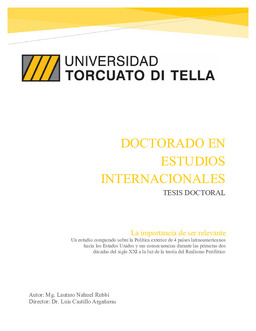| dc.rights.license | https://creativecommons.org/licenses/by-sa/2.5/ar/ | es_AR |
| dc.contributor.advisor | Castillo Argañaras, Luis | es_Ar |
| dc.contributor.author | Rubbi, Lautaro Nahuel | es_AR |
| dc.coverage.spatial | América Latina | es_AR |
| dc.coverage.spatial | Estados Unidos | es_AR |
| dc.date.accessioned | 2022-10-12T12:53:25Z | |
| dc.date.available | 2022-10-12T12:53:25Z | |
| dc.date.issued | 2021 | |
| dc.identifier.uri | https://repositorio.utdt.edu/handle/20.500.13098/11346 | |
| dc.description.abstract | El Realismo Periférico es una teoría de política exterior pensada desde y para los países periféricos que no poseen el poder suficiente para dictar las reglas en el sistema internacional. Según la misma, para no sufrir costos asociados a la confrontación con las grandes potencias, estos Estados deben desarrollar una política de alineamiento hacia los formadores de reglas del sistema. Sin embargo, diversos ejemplos empíricos apuntan a una amplitud diversa en el margen de maniobra de los países periféricos en su relación con los grandes poderes: en tanto algunos ven castigado su comportamiento frente al menor intento de oposición, otros han podido desarrollar políticas exteriores explícitamente confrontativas sin incurrir en costos inmediatos. Cabe preguntarse entonces por la razón explicativa detrás de las distintas respuestas abordadas por los hacedores de reglas del sistema. A partir de un estudio comparado de cuatro casos latinoamericanos (Argentina, Brasil, Colombia y Venezuela) y sus relaciones con los Estados Unidos en las primeras décadas del Siglo XXI, este trabajo plantea como hipótesis que el valor estratégico de los países periféricos opera como variable interviniente moderadora o condicional de la relación entre la política exterior de los países periféricos y la respuesta de las grandes potencias. Asimismo, se resalta la importancia explicativa de la variable contextual de la configuración del Sistema internacional en un determinado momento histórico. Se concluye que ambas son variables omitidas por la teoría en su versión original y cuya inclusión sistemática en los análisis desde la misma es fundamental para aumentar su poder explicativo. | es_AR |
| dc.description.abstract | Peripheral Realism is a theory of foreign policy designed from and for peripheral countries that do not possess sufficient power to dictate the rules in the international system. According to it, in order not to suffer costs associated with the confrontation with the great powers, these countries must develop a policy of alignment towards the rule-makers of the system. However, several empirical examples point to a different scope of action for peripheral countries in their relationship with the great powers: while some see their behaviour punished in the face of the least attempt of opposition, others have been able to develop explicitly confrontational foreign policies without incurring in immediate costs. It is worth asking, then, why the answers given by the system's rule-makers are so different. Based on a comparative study of four Latin American countries (Argentina, Brazil, Colombia and Venezuela) and their relations with the United States in the first decades of the 21st century, this paper hypothesizes that the strategic value of the peripheral countries operates as a moderating or conditional variable in the relationship between the foreign policy of the peripheral countries and the response of the great powers. Likewise, the explanatory importance of the contextual variable of the configuration of the International System at a given historical moment is highlighted. It is concluded that both are variables omitted by the theory in its original version and whose systematic inclusion in the analyses is fundamental to increase its explanatory power. | es_AR |
| dc.format.extent | XVIII p. | es_AR |
| dc.format.extent | 658 p. | es_AR |
| dc.format.extent | dcclxviii p. | es_AR |
| dc.format.medium | application/pdf | es_AR |
| dc.language | spa | es_AR |
| dc.rights | info:eu-repo/semantics/openAccess | es_AR |
| dc.subject | Relaciones internacionales | es_AR |
| dc.subject | Política exterior | es_AR |
| dc.subject | International relations | es_AR |
| dc.subject | Foreign Policy | es_AR |
| dc.title | La importancia de ser relevante Un estudio comparado sobre la Política exterior de 4 países latinoamericanos hacia los Estados Unidos y sus consecuencias durante las primeras dos décadas del siglo XXI a la luz de la teoría del Realismo Periférico | es_AR |
| dc.type | info:eu-repo/semantics/doctoralThesis | es_AR |
| thesis.degree.name | Doctorado en Estudios Internacionales | es_Ar |
| thesis.degree.grantor | Universidad Torcuato Di Tella | es_Ar |
| thesis.degree.grantor | Departamento de Ciencia Política y Estudios Internacionales | es_Ar |
| dc.subject.keyword | Realismo Periférico | es_AR |
| dc.subject.keyword | Valor Estratégico | es_AR |
| dc.subject.keyword | Peripheral Realism | es_AR |
| dc.subject.keyword | Strategic Value | es_AR |
| dc.type.version | info:eu-repo/semantics/acceptedVersion | es_AR |

